Climate Change & the Rule of Law
21 September 2015
Some of the world's leading judges, lawyers and legal academics met in London last week (17-19 September) for a special three-day symposium on climate change and adjudication, hosted by the Dickson Poon School of Law at King's College London, with the support of The UK Supreme Court, HM Government, the Journal of Environmental Law, the Asian Development Bank and the United Nations Environment Programme.
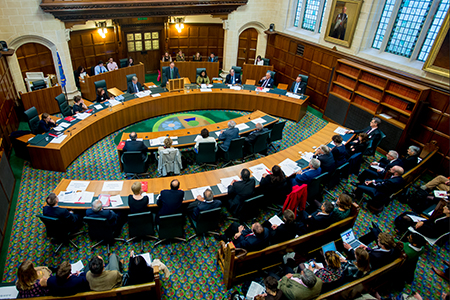
The London symposium, which welcomed over 25 eminent international jurists, legal practitioners and academics, was timed ahead of the UN climate change conference in Paris this December to explore the extent to which courts are equipped to deal with the breadth and complexity of problems thrown up by climate change, and what changes might be needed to ensure that legal systems can keep pace with increasing demands to resolve environmental disputes. Delegates discussed how the uncharted territory of developing 'climate change law' is highlighting significant challenges for courts in adjudicating disputes.
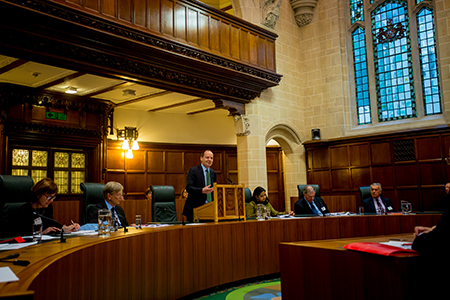
Lord Carnwath, Justice of the UK Supreme Court and member of the International Advisory Council for Environmental Justice of UNEP, led judicial engagement in the programme and arranged for use of the UK Supreme Court as one of the host venues for the event.
HRH The Prince of Wales was invited to write a message in support of the symposium. The message was read out to delegates on the first day of the conference.
The symposium included two events open to the public, one of which was staged at the Supreme Court. On the evening of 17 September, Professor Philippe Sands QC discussed with Professor James Crawford, Judge of the International Court of Justice, and Professor Lavanya Rajamani, Centre for Policy Research, New Delhi, the potential role of international judges and courts in addressing the legal issues relating to climate change. Over 100 guests packed Courtroom One to hear Professor Sands' lecture, the text of which is now available to download.
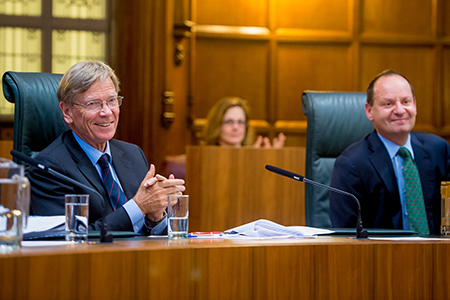
YouTube channel.The lecture and discussion chaired by Lord Carnwath, were live streamed via the UKSC website to hundreds of viewers worldwide and is now available to watch back on our
The following evening (18 September), Lord Carnwath discussed with international colleagues the experiences of domestic and specialist courts in dealing with climate change issues at a second public event, this time held at King's College. Lord Carnwath was joined for the discussion by distinguished jurists including Justice Brian J Preston, Chief Judge of the Land and Environment Court of New South Wales, Australia; Justice Swatanter Kumar, Chairperson of the National Green Tribunal, India, and Former Justice of the Indian Supreme Court; and Justice Antonio Benjamin, Justice of the National High Court of Brazil.
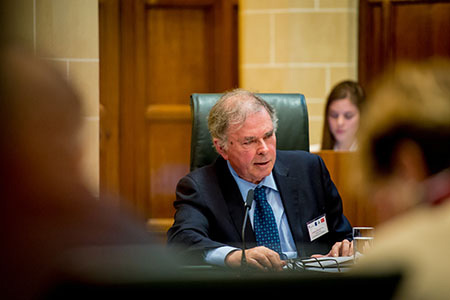
The conclusions and findings from the symposium's discussions will form a brief statement of the legal issues created by climate change for adjudication, due to be published in the final issue of the Journal of Environmental Law of 2015. The conference organisers hope that this document will provide a framework in developing judicial responses to climate change.
Professor Liz Fisher, General Editor of the Journal of Environmental Law and Professor of Environmental Law at Oxford University, said: "the effectiveness of any international climate change treaty or legislative regime also depends on understanding how climate change challenges and disrupts our legal systems and how they respond. The framework we will produce will help our understanding in that process".
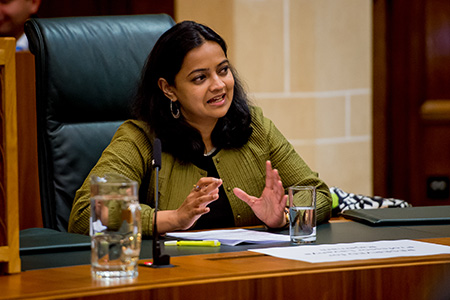
Useful links
- Video of the Climate Change & the Rule of Law lecture on The Supreme Court's YouTube channel
- Professor Sands' lecture on Climate Change and the Rule of Law (PDF)
- HRH The Prince of Wales' letter in support of the symposium (PDF)
- More details of the symposium, on the King's College London website
- Report on symposium by Professor Chris Hilson of the School of Law at the University of Reading